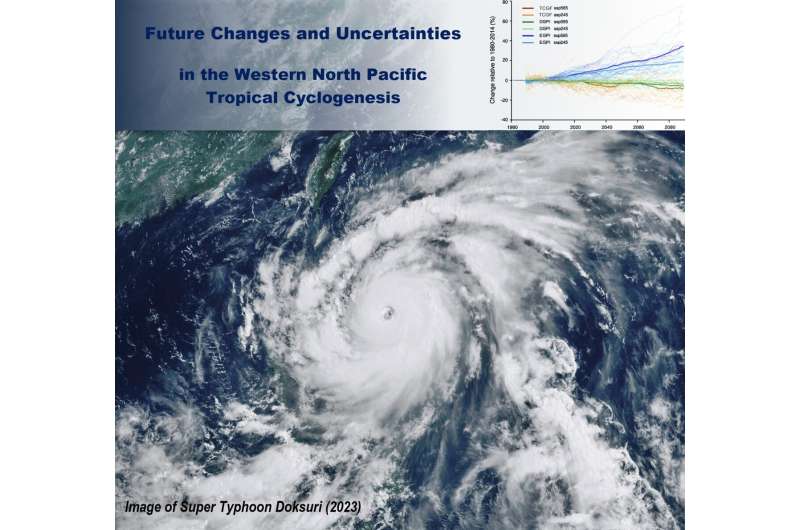This article has been reviewed according to Science X's editorial process and policies. Editors have highlighted the following attributes while ensuring the content's credibility:
fact-checked
peer-reviewed publication
trusted source
proofread
Study highlights need for enhanced tropical cyclone identification and simulation in climate models

Tropical cyclones in the western North Pacific (WNP) stand as formidable natural forces, wreaking havoc on Earth and posing significant challenges to disaster preparedness. As we grapple with the uncertainties of future projections for WNP tropical cyclone activities, a recent study published in Environmental Research Letters sheds light on the crucial need to enhance identification and simulation techniques in climate models.
Led by Dr. Xin Huang from the Shanghai Typhoon Institute of China Meteorological Administration and Professor Tianjun Zhou from the Institute of Atmospheric Physics at the Chinese Academy of Sciences, the study explores the large uncertainties surrounding the future changes in WNP tropical cyclogenesis based on projections from the latest Coupled Model Intercomparison Project Phase 6 (CMIP6) climate models.
The study categorizes projection uncertainties into four main sources: scenario uncertainty, model uncertainty, internal variability, and scheme uncertainty. Notably, the limited theoretical understanding of tropical cyclogenesis makes scheme uncertainty a predominant factor in all future periods.
The dual impact of global warming, creating both hostile dynamic environments and favorable thermodynamic conditions for tropical cyclone formation, adds complexity to projections based on different identification schemes.
The research emphasizes the urgency of addressing these uncertainties and identifies the need to enhance tropical cyclone identification and simulation techniques in climate models. The findings stress that improved predictive capabilities will not only refine climate adaptation strategies but also fortify resilience in coastal regions vulnerable to the devastating impacts of tropical storms.
In the face of climate change, this study calls for collective efforts to unlock the mysteries of tropical cyclone behavior, paving the way for more accurate projections and proactive measures to safeguard communities and ecosystems.
More information: Xin Huang et al, Understanding uncertainties in projections of western North Pacific tropical cyclogenesis, Environmental Research Letters (2023). DOI: 10.1088/1748-9326/ad02ad
Journal information: Environmental Research Letters
Provided by Chinese Academy of Sciences





















